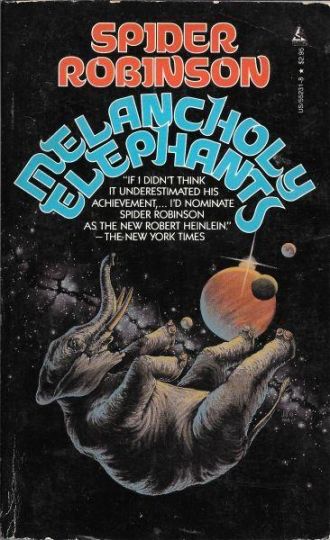Kris
I supposed this is technically a story but really it is an essay on IP. Important and still relevant but only as much a work of fiction as any Socratic dialogue.
I am going to try to read the others this year before rereading and rendering my full judgement as there are some very big names he beat out and I am curious that a piece getting angry at van Vogt’s lawsuit of Alien won.
Looking at the others I feel like this is possibly the weakest (probably would have put Spider Rose at the top of my ballot), and yet, it is addressing a key issue that is incredibly relevant today something none of the others really do.
In fact, Ed Sheeran could be accused of plagiarising this story when he said earlier this year: “There’s only so many notes and very few chords used in pop music. Coincidence is bound to happen if 60,000 songs are being released every day on Spotify. That’s 22 million songs a year, and there’s only 12 notes that are available.”
Brian:
I have to respect this one. I mean really. Spider Robinson is known for being opinionated and “Melancholy Elephants” sure is that. Somehow I missed, on my first reading, how specific Robinson’s examples are; I mean he calls out specific people who were still very much alive and active. I have to wonder if Ben Bova and Harlan Ellison got into arguments with Robinson over this story. It would not be surprising. The irony is that I think this is also Robinson at his most agreeable, in that I’d say he’s very much in the right on this issue.
But if it sounds like I’m responding to an article Robinson wrote and not a short story, it’s because “Melancholy Elephants” barely qualifies as a short story. Like sure it qualifies, but it’s essentially a Socratic dialogue; the characters are only there to provide the flimsiest of pretexts for what Robinson wants to talk about. He does it well, but there’s no denying that that the protagonist is a mouthpiece for Robinson. If you’re looking for aomething more conventional then you’ll probably be disappointed, and even then I’m surprised Analog readers took so well to it. Not only did it win the Hugo, it topped the Analog readers’ poll for that year. That’s an achievement for someone who calls out Analog’s previous and much celebrated editor.
I’m glad I reread it. I got more of a clue as to what Robinson is reacting to, because this story feels both prescient and of its time; you can almost pinpoint exactly when Robinson would’ve written it, given what he cites. But if the purpose of the story was to raise awareness about what were (and are) becoming archaic copyright laws, I think it was a job well done.
Kit
The tone of this is very… odd. Like, even before you get to anything happening, there’s this strong sense that he is Making A Point with all the weird location details; it doesn’t feel like a real world at all. It actually felt really, really familiar, so much so that I was distracted trying to figure out where I’d read something with this style before, and then realized I was being reminded of “David Weber Orders a Pizza.” The weird interspersions of exposition that has nothing to do with what the characters are actually doing seems the same. As does the tone. But I feel like I lack context to know exactly what’s being lampooned here– because something is definitely being lampooned, but since parody is the most reliant on context and the quickest thing to age, it doesn’t land, so I can’t tell anything about it. And then once she actually gets into the office, the tone shifts completely into a not-very-subtle dialogue, where this makes its dive into “barely a story.” It’s an essay making a political point. (He was prescient about copyright, though; I will give him that. It’s a good argument, one that still applies today.)
Mikayla
I don’t think I particularly like this as a story, the lead up to the conversation feels completely disconnected to the actual point of the story, and the conversation feels more like an essay arguing a point than it does a conversation, but the topic being discussed is remarkably relevant to today.
With copyright being extended for longer and longer periods, Disney being Disney, and things like trying to claim copyright on Sherlock Holmes having emotions, if the technology references in this story were updated (and it was perhaps rewritten as an essay rather than trying to frame the argument as a story) this could very well have been written today as a commentary about what’s happening now.

